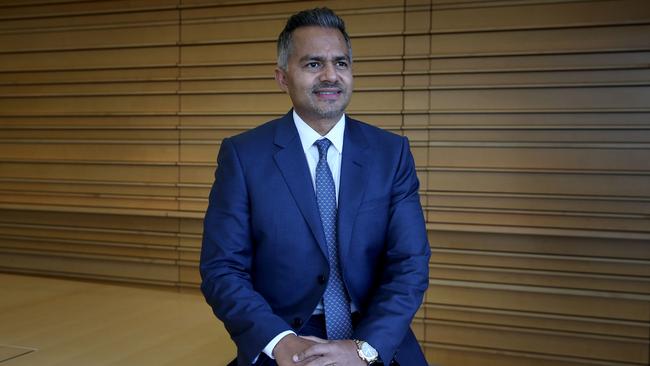Residential property developer Stockland flags shift into logistics and new partnerships
Australia’s largest residential property developer will keep riding the housing boom, but will also forge more deeply into offices and the industrial market.

Diversified property giant Stockland sees the hot residential market moderating, with chief executive Tarun Gupta saying this would be the best course for the market as it could not continue at its present pace, as he unveiled a new corporate strategy.
The country’s largest home developer flagged it would look to also grow its ownership of residential properties which could help it ride the cycle, as lending conditions tighten.
“Overall residential is in a good place and the tailwinds are still blowing,” Mr Gupta said. “We’ve seen a really strong demand continuing … October was again a very solid month for us.”
“Longer term, we think that price growth will moderate; it’s been running too hard, it needs to moderate for the health of the market,” he said.
But short term, he said there was still very strong demand across town houses, estates and land lease communities.
Mr Gupta flagged the company would look at capitalising on its status as the largest listed residential developer and seek to become an owner as well as selling homes.
“We will add ownership like we are doing in land lease communities,” he said, pointing to opportunities in apartments and build-to-rent.
He called out Stockland’s desire to get involved in larger mixed use projects that drew on commercial and residential skills. “We are interested in doing more projects in our big cities,” Mr Gupta said.
The property company will look to charge up its commercial property portfolio by taking on larger projects with the backing of capital partners.
Stockland will slash its exposure to retail and retirement living, finally cutting ties with its infamous “3R” strategy, in which those divisions were prioritised alongside its strongly performing residential division.
It will instead speed up the delivery of big ticket office and industrial projects, where it has been expanding again, although competition for sites remains fierce.
The developer also wants to cement its leading home estate business, push further into the new style land lease business, get back into apartments and explore doing build-to-rent projects.
“Our strategy is designed to build on Stockland’s strong platform and to capitalise on structural long term trends including urbanisation and urban renewal; growth in institutional capital; digital acceleration and the continued momentum in ESG,” Mr Gupta said.
Stockland wants to deliver on its $33bn secured development pipeline faster. It plans to kick off about $10bn worth of developments within five years and to keep stakes of 25-50 per cent in the projects, which include offices in North Sydney, Macquarie Park and a redevelopment of the Piccadilly Complex in the Sydney CBD.
It also wants to lock in the strong margins from its $21bn land estates beyond the current residential boom. The company flagged plans to convert parts of its land bank into more lucrative uses and it will also chase mixed use opportunities, where rivals are stronger.
Stockland will also follow other property companies and seek out large scale institutional capital partnerships in each sector, to help aid its growth and build up a funds management empire after years effectively out of this arena.
The “dynamic” shift will see Stockland grow residential, office and logistics from half its holdings to more than 70 per cent of its portfolio. The under-pressure retail and retirement areas will be cut back from half the portfolio to less than 30 per cent, with sales of more centres on the agenda.
The company’s $5.5bn retail holdings will be split into three buckets — core, non-core to be sold and $1.1bn of essentials centres — which will be diverted into an external fund, in keeping with the dramatic rerating of these assets.
Overall, Stockland will derive about 60 per cent of its income from passive holdings that deliver returns of 6-9 per cent and development will make up 40 per cent and show returns of 14-18 per cent.
Mr Gupta said the strategy “reweights our business towards sectors underpinned by long term trends and targets third party capital to create new, recurring income streams and drive higher return on capital, while maintaining a strong balance sheet”.
Stockland has been on a hiring binge to stock up its senior ranks that now include former CPP Investment Board executive Justin Louis as chief investment officer, ex-Lendlease executive Ben Christie running apartments and former UBS banker Clem Salwin in charge of retirement, where a “capital solution” is being sought.
Morgan Stanley analyst Lauren Berry said the strategy moves were “the right path to create a more resilient portfolio, albeit trade-off may be some near-term earnings dilution”.
Stockland shares closed down 7c, or 1.5 per cent, at $4.58.





To join the conversation, please log in. Don't have an account? Register
Join the conversation, you are commenting as Logout